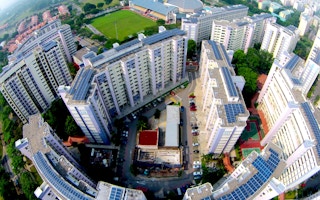Apple Computer, the world’s largest technology company, will begin using solar power to run all of its facilities in Singapore from next year, in line with its target to use only renewable energy at its properties worldwide.
To continue reading, subscribe to Eco‑Business.
There's something for everyone. We offer a range of subscription plans.
- Access our stories and receive our Insights Weekly newsletter with the free EB Member plan.
- Unlock unlimited access to our content and archive with EB Circle.
- Publish your content with EB Premium.
The United States-based firm will be working with Singapore’s solar company Sunseap Group, which will supply the tech giant with energy generated by solar panels on the rooftops of more than 800 buildings in Singapore, including residential blocks, Sunseap said in a statement on Monday.
This arrangement will make Apple the first company in Singapore to be 100 per cent powered by renewable energy, according to the statement.
Lisa Jackson, Apple’s vice-president of environment, policy and social initiatives, said: “Climate change is one of the great challenges of our time, and it’s going to take determination and innovation to make the much needed transition to a green economy.”
“This deal will cover all of our electricity needs in Singapore, including our 2,500-person corporate campus and new retail store. We’re thrilled to be working with Sunseap and the government of Singapore to pioneer new ways to bring solar energy to the country — and bring Apple even closer to our goal of powering our facilities around the world with 100 per cent renewable energy.”
Apple has been powering all its data centres worldwide with renewable energy since 2013. All its operations in the U.S. run on only clean energy and by next year, its operations in China will also be powered solely by renewables.
In Singapore, Sunseap - one of the biggest homegrown suppliers of solar energy - will channel the surplus power produced by its portfolio of 800 buildings of up to 40 GWh (gigawatt-hours) into Apple’s facilities through an off-site power purchase agreement (PPA).
The PPA allows companies and building owners to use renewable energy without installing solar systems on their own their rooftops, Sunseap said.
Currently, about 60 per cent of the power generated by Sunseap across Singapore are from panels spread over 900 tall housing blocks, also known as Housing Development Board (HDB) flats, a company spokesperson said. Of that energy, about 60 to 70 per cent are fed into the grid.
The deal, of an undisclosed amount, will also include a on-site rooftop solar project of 1.1MWp (megawatt peak) Sunseap is now installing on the rooftops of Apple’s main building in Ang Mo Kio under a solar leasing agreement.
Solar leasing is a scheme under which the solar company pays the upfront and maintenance costs of the solar panels in exchange for monthly payments from a building or property owner.
This arrangement allows building owners to begin immediately saving on their energy bills without the huge initial investment, and solar firms to have a predictable cash-flow.
Besides the main campus, the programme will also power Apple’s rumoured flagship retail store at Orchard Road’s Knightsbridge shopping mall, according to reports by the Straits Times.
Frank Phuan, managing director of Sunseap, said “Sunseap is pleased to introduce new initiatives in Singapore’s energy sector to provide clean energy solutions to both international and local organizations. We expect a ripple effect for organizations in Singapore to incorporate sustainability practices in their businesses, especially for listed companies.”
While solar energy accounts for less than 5 per cent of Singapore’s energy, the industry has grown in recent years. Currently, about 33 MWp of photovoltaic capacity is installed, generating enough electricity to power 6,600 two-bedroom apartments.
By 2020, the Singapore government aims to install 350MWp of solar capacity in the country.










